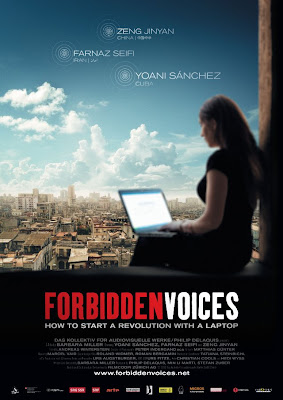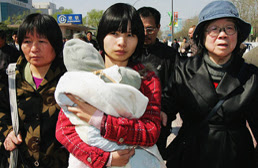 |
| Forbidden Voices movie poster. |
Written by Leigh Kolb
In repressive societies, voices of dissent are dangerous to the regime, and are stifled as quickly as possible. The documentary Forbidden Voices, by filmmaker Barbara Miller, weaves together the struggles of three female bloggers who have done tremendous work against the governments that have tried, sometimes successfully (but only temporarily), to silence them.
 |
| Yoani Sanchez |
Yoani Sanchez, Cuba
Yoani Sanchez’s blog has been censored by the state. She has been beaten by police. She says, “I live in fear.” But she keeps writing. She has been profiled as one of Time magazine’s 100 most influential people and toward the beginning of the film, she’s unwrapping and lovingly sniffing her brand new book, Cuba Libre. Sanchez is featured in Forbidden Voices as a prominent Cuban blogger. She not only spends her time writing and covertly updating her blog, but she also holds blogging workshops for other writers and is a human rights activist (the film focuses on her work for a specific political prisoner who is on a hunger strike).
Sanchez’s parts of the film–since she is still active in her country–are powerful and disturbing. The recording of her being beaten by police is played and there is footage of protests and state-sanctioned counter-protesters. While Sanchez is not safe–she knows her phone is tapped and constantly feels like she’s in danger–she keeps working. She says that she does so for her son, so she can answer him when he asks, “Mom, what did you do to help change things?”
 |
| Farnaz Seifi |
Farnaz Seifi, Iran
When Farnaz Seifi started her blog in 2003, the Iranian government had little to do with censoring the blogosphere. Six months after she and a few other women started blogging about women’s issues in Iran, the censorship and arrests began.
In the film, Seifi explains how the Iranian revolution caused women to lose all of their rights. She cites the legal case that if a man’s genitals were to be hurt in a car accident, there’s more money awarded to him than if a woman is killed in a car accident.
Seifi says that she was drawn to blogging because “You can be the media yourself.” Shortly after, the government started filtering the word “women” and access to the women’s rights activists’ blogs was denied. Feminist groups held peaceful protests, and police responded with brutality (the film has footage). Seifi was arrested, and she now lives in exile and works with Reporters Without Borders. When she is featured in Forbidden Voices, it’s clear that she aches for her family and for making change in her home country. She, against her desires to have her name out there, blogs anonymously to protect her family. Seifi speaks of the “cyber war” and that at this point it is a “cyber army vs. the government.” Online activism and social media have been a central focus during the uprisings in the Middle East, and Seifi’s interests in writing about the abuses of women’s rights have helped keep the momentum going.
 |
| Zeng Jinyan |
Zeng Jinyan, China
Zeng Jinyan has used blogs and Twitter to speak out against human rights abuses in China. Her activism has resulted in house arrest (which is shown in the film). Her husband was imprisoned for over three years for his AIDS/human rights activism, and she and their new baby were kept in an apartment. But she continued to write.
In the film, she says, “I’m desperate. I don’t know what to do.” She is continually shadowed by agents (in one chilling scene, they repeatedly try to block her from moving forward on the sidewalk). Their apartment was searched, phones and computers were confiscated and their internet was shut off. She argues that their freedom of speech is protected by the Chinese constitution, but it’s being ignored. Jinyan explains the “great firewall of China,” the cyber police, and the fact that many people don’t even know about Tiananmen Square. “Everything resembles Orwell’s 1984,” she says. She focuses on how cruel the house arrest is for her daughter, who is growing up with an imprisoned father and no access to parks. Jinyan says, “My keyboard now is the only thing that helps me bear my sorrow and indignation.”
Forbidden Voices is a compelling and deeply disturbing documentary that makes those of us who freely sit at our laptops and type realize how much we take for granted, and how powerful these women’s voices are in their repressive societies (and how threatening that power is, which is evident in the fact that they are continually threatened and silenced). The end of the documentary points out that there are thousands of Internet activists in jail right now. This wave of courageous blogging, especially at the hands of women like Sanchez, Seifi and Jinyan, is a threat to patriarchal, repressive regimes. May their voices stay strong.
Forbidden Voices is a selection from Women Make Movies, an organization that “facilitates the production, promotion, distribution and exhibition of independent films and videotapes by and about women.”
Leigh Kolb is a composition, literature and journalism instructor at a community college in rural Missouri.
